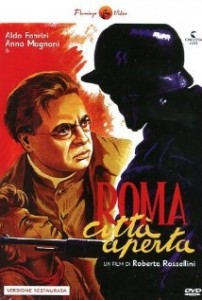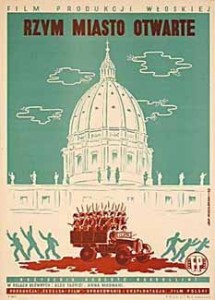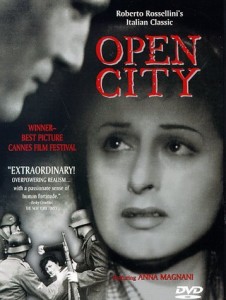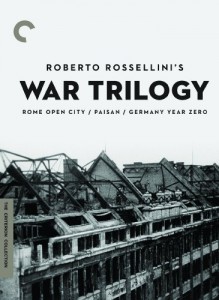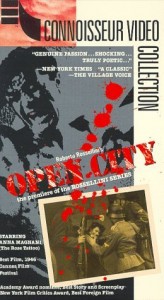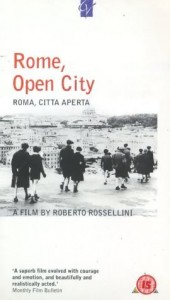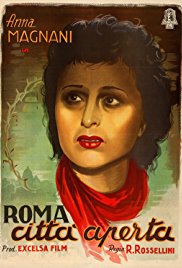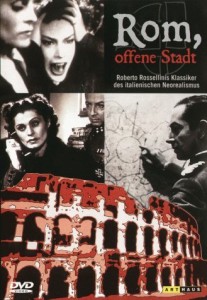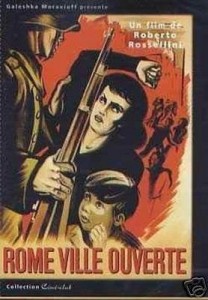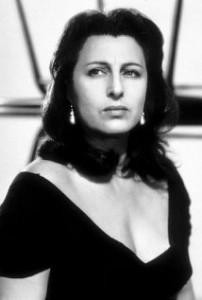Rome, Open City [Roma Città Aperta] ***** (1945, Anna Magnani, Aldo Fabrizi, Marcello Pagliero) – Classic Movie Review 869
Director Roberto Rossellini’s famous, great 1945 neo-realist classic Rome, Open City [Roma Città Aperta] focuses on a group of foolishly brave Italian resistance members, who try to oppose the sadistically evil occupying Nazi forces with the help of a kindly, foolhardy priest during the final days of the occupation of Rome at the end of World War Two.
Along with the Nazi occupation, there is a curfew, basic foods are rationed and the ruthless, relentless Germans are still searching for Italian resistance workers to torture and kill. The history, settings and locations are real, but the story is entirely made up, but it is so vivid and archetypal it also feels ‘real’.
Rome, Open City is a brutally tough-toned, surprisingly merciless movie, never ducking the truth or harsh facts, so don’t look for a happy ending. It is an inspiring tragic story, offering only the comfort of the next life or the next generation. There are enlightenment and information in the film, and a kind of hope and uplift at the end, but little joy or entertainment to be found. Indeed, it is quite a depressing experience, with a long, endless seeming torture sequence and the deaths of several, indeed most, of the main characters.
The film achieves a remarkable atmosphere of persuasive, documentary-like authenticity, thanks to location filming under difficult circumstances, as well as to the high quality of Rossellini’s screenplay (co-written by Federico Fellini and Sergio Amedei) and the distinguished, naturalistic performances that, like the film, have impressively survived the test of time.
All this gives it a surprising freshness and relevance on its 2014 digitally restored re-release. It is in brilliant near-mint condition now, whereas the old print was badly scratched and jumpy. The exterior shots of war-torn Rome are valuable, poignant documents of the time now. They seem so ‘real’ that you feel in your head that you are actually there.
Among the ensemble of actors, especially notable are Aldo Fabrizi as the noble, warm-hearted Catholic priest Don Pietro Pellegrini and Anna Magnani as the pregnant resistance worker Pina, who is about to wed her next-door neighbour atheist boyfriend Francesco (Francesco Grandjacquet), when his resistance boss friend, Giorgio Manfredi (Marcello Pagliero) turns up and gets her to shelter him from the Gestapo.
There is understandably a slight air of forced propaganda, of course, but fortunately that only very slightly works against the film and dates it and mars its otherwise very considerable subtlety and bleak, frank honesty. The Italians we see are almost all willing to sacrifice their lives for the cause and for their friends, except for any deluded traitor in their midst. The Germans, on the other hand, are disgusting, effete sadists, relishing the torture and death of the Italians.
It is very unfortunate that the Gestapo boss, Major Bergmann, is played by Austrian actor Harry Feist as a slightly mincing homosexual, and that his main helper is a very mannish woman soldier, who uses her wicked wiles to persuade an Italian girl into betraying the group. Those were the times, of course, but bad times in every way.
But, overall, Rome, Open City [Roma Città Aperta] is best seen as a great tribute to human bravery and courage in the worst possible circumstances. And it is an urgent reminder of how Italy has gone through such a terrible lot in its troubled history.
Ubaldo Arata’s black and white verité camerawork and Renzo Rossellini’s score are also outstanding.
Maria Michi (as Marina Mari), Nando Bruno (as Agostino the sexton), Joop van Hulzen (as Captain Hartmann) and Vito Annichiarica (as Piccolo Marcello) also star.
Roberto Rossellini was the winner of the Grand Prix of the Festival at the Cannes Film Festival in 1946. The screenplay was Oscar nominated for Sergio Amidei and Federico Fellini in 1947. The New York Film Critics voted it Best Foreign Language Film in 1946.
Magnani went on to win a Best Actress Oscar for The Rose Tattoo (1955). She died on aged 65, in Rome where she was born and where this film is set and made. Her last film appearance was in Fellini’s Roma in 1972.
Rome, Open City [Roma Città Aperta] was released as part of Roberto Rossellini’s War Trilogy on the Criterion Collection, along with Paisà and the 1948 Germany Year Zero [Germania Anno Zero].
© Derek Winnert 2014 Classic Movie Review 869 derekwinnert.com

